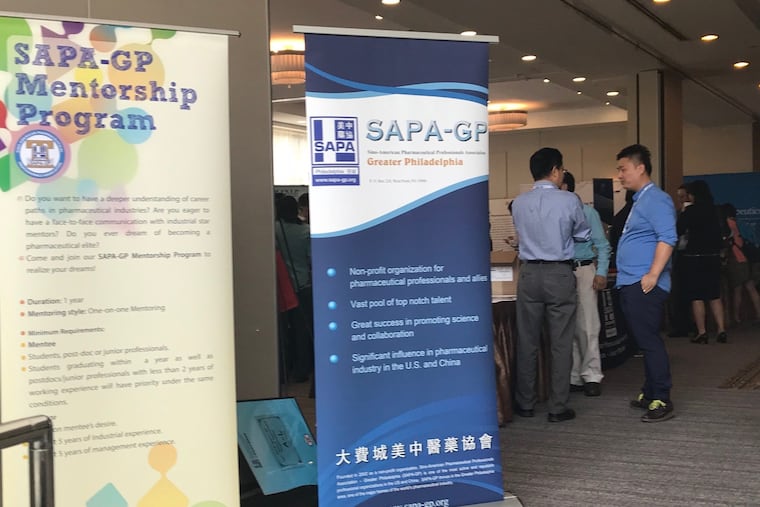Sino-American Pharma Pros draws China, U.S. drugmakers to Philly
"They are discovering the next generation of therapies, and creating a community."

In a cheerful cacophony of start-up and recruiter pitches, emerging-science talks and investment-banking tips, laptop displays and card exchanges — in English and in Mandarin — close to 1,000 Philadelphia-area scientists, pharma professionals, and people who want to do business with them jammed a hotel lobby and meeting rooms in King of Prussia on a Friday for the largest yearly conclave in the 16-year history of the Sino-American Pharmaceutical Professionals Association-Greater Philadelphia chapter.
The group says it is the largest local affiliate of a growing, international organization that works to advance the Chinese-American community of pharma developers, technologists, corporate managers, and investors, winning the attention of big business, universities, and governments in both countries.
"We used to meet in people's basements," said Jing Yang, Ph.D., a Senior Principal Scientist at Bristol-Myers Squibb and president-elect of the Philadelphia group. Yang said its volunteer leaders are building ties with Philadelphia officials, who have suggested they consider setting up a permanent office at the University City Science Center close to Penn, Drexel, and CHOP — "where all the action is."
Early meetings were scientific and topical. A conference on immuno-oncology is in the works. In recent years the group has expanded its focus to include business, Yang added, addressing questions such as "'How do you do a merger or an acquisition? How do you get financing from Morgan Stanley?'"
Her predecessor, Zhenhua Wu, Ph.D., head of preclinical development at United Neuroscience, assured me SAPA-GP remains "an organization focused on both science and business, in addition to career development," and has worked in recent years, "not only on advancing pharmaceutical research, but also on connecting science and business between US and China." He added that volunteers will accelerate this program "in the next five years for sure," and that there's work to be done making Philadelphia a better home for biotech startups.
The rapid broadening of interest "has a lot to do with how fast China is moving," Yang said. "From our professional point of view, discussing science is not enough" — especially since last fall, when China's drug agency agreed to join the International Council for Harmonisation, a sign it will more readily accept foreign drug clinical tests.
The move opens China's large and growing market to U.S. and other manufacturers and making it easy for Chinese bioscience to be adapted for Western products.
"So from the Chinese point of view there is a big surge of money. So many investors looking for biotech companies," said Yang. "Ten years ago, Chinese companies came here looking for (biotech) tenants. Five years ago, they looked for projects they could bring home. Now, they are coming here to invest in U.S. biotechs, not to bring them back to China. They are bringing money to invest here. We would like to have big pharma in China land in Philadelphia."
Just since last fall, Dr. Zhenhua Huang's KBP Biosciences, of Philadelphia, has reported raising $76 million for U.S. tests of China-developed heart, lung, and infection-fighting drugs from China-based Advantech Capital, China's State Development and Investment Corp., an arm of the Ping An Insurance group, and other China and U.S.-based companies. Tmunity Therapeutics, a T cells-based company set up by cancer fighter Dr. Carl June and his partners, has raised $100 million from Ping An and other U.S. and Asian investors. An affiliate of WuXi AppTech Co. Ltd. invested at least $5 million in Baltimore-based "artificial intelligence" clinical testing support developer Insilico Medicine last week.
"The Greater Philadelphia area is one of the major hubs for global pharmaceutical companies," and for medical-academic institutions, making it a natural magnet for Chinese professionals, added current chapter president Han Dai, Ph.D., a senior fellow at GlaxoSmithKline, which has a research center in Collegeville and a sales and marketing center at the Navy Yard in South Philadelphia (updated 6/28).
"Business to China is booming," said James Fendrick, one of the King of Prussia visitors and the second-generation president of Rockland Immunochemicals Inc., a Limerick firm that supplies life-science research tools to Penn and Harvard, Merck and Glaxo, and other big institutions.
"Over the past decade, the Chinese government has designated life science to be a major thrust," Fendrick added. He said the Chinese-Philadelphia pharma community members are pushing to expand their science, U.S.-China trade relations, and their own community — in addition to working "long hours and full-time jobs," and raising families.
He said members are drawn from three major pharma sectors — biologics, cancer drugs, and cell-and-gene therapy. "The ecosystem in Philadelphia is just exploding," Fendrick concluded. "They are discovering the next generation of therapies, and creating a community." (This item has been updated and expanded.)